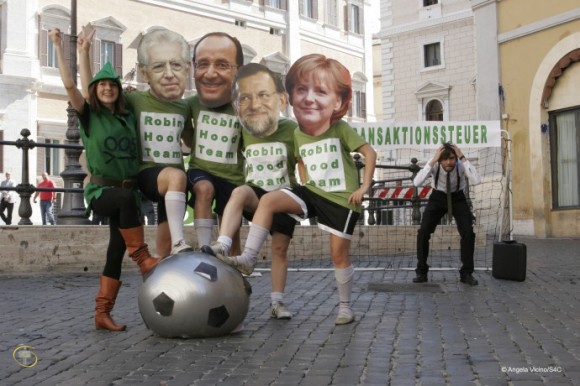A coalition of willing countries today agreed to press ahead with plans for a European Financial Transaction Tax (FTT). Their decision came after proposals for an EU-wide tax foundered in the face of opposition from the UK and a handful of other countries.
Speaking at the EU Finance Ministers’ meeting in Luxembourg today, Finance Minister Wolfgang Schaeuble said that ten countries were prepared to use the EU process known as ‘enhanced cooperation’ to work together to introduce the tax. The enhanced cooperation procedure requires at least nine governments to agree to work together on a proposal.
“My impression is that quite a number of member states strongly support the proposal of an FTT in principle,” Schaeuble said after the meeting. “We should give it a try.”
Leaders of the four big Eurozone countries, Germany, France, Italy and Spain, also expressed their support for a common FTT at talks in Rome today.
“I am pleased that all four here have committed to a Financial Transaction Tax,” Germany’s Chancellor Angela Merkel said.
She added that the tax would be welcomed because “the people in our countries have the impression that the crisis started in the financial markets and that they have not contributed enough to the solution.”
French President François Hollande said the leaders would be pushing forward with the tax even without the support of all 27 EU countries.
“It can only come about through enhanced cooperation, and I, along with my partners, will make it so that the European council authorises us to enact that… as quickly as possible,” he said.
David Hillman, Robin Hood Tax spokesman, said: “We are delighted that a coalition of European countries has agreed to press ahead with a Financial Transaction Tax.
“But the UK public will be rightly angry that George Osborne is resisting efforts to make the City pay its fair share. A Robin Hood Tax would boost growth as well as raising billions to tackle poverty and protect public services at home and abroad. A fully functioning European FTT – combined with its continuing popularity with the public – will make this government’s opposition increasingly untenable.”
Nicolas Mombrial, Oxfam’s EU spokesperson, said: “At next week’s EU Heads of State Summit, as many governments as possible must join the French, Germans and other countries and show they’re ready to put the interests of ordinary people before those of the financial sector.
“To gain popular support, a significant part of the revenues should go to people who have been hit hardest by the economic crisis in poor countries, as suggested by Presidents Hollande and Barroso this week. Using the proceeds of a new tax only for EU projects or to pay down deficits would be a betrayal of the millions who support a Robin Hood Tax.”
Submitted by the Robin Hood Tax campaign


![RHT poll cover 3[9]](https://stampoutpoverty.files.wordpress.com/2012/06/rht-poll-cover-391.jpg?w=580&h=213)